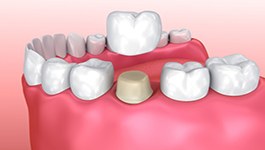Dental Crowns Wakefield
Rebuilding Damaged Teeth

Our teeth go through a lot for us, and when they get damaged, Schumacher Dental is committed to taking all necessary measures to repair and preserve them. A cracked tooth can result from biting into something hard, teeth grinding, or trauma from an accident.
When a tooth cracks, the protective enamel is compromised, leaving the more vulnerable parts exposed. Dentin, a softer and porous layer housing the area around your nerve, becomes susceptible to decay or more extensive fractures. To protect your tooth, we recommend restoring it with a dental crown in Wakefield.

What Is a Dental Crown?
A dental crown is a custom-made dental restoration that fits snugly over a tooth. Sometimes called a "cap," it restores the strength, function, and appearance of a healthy smile. Traditionally, dental crowns required two visits, spaced a couple of weeks apart. But, at Schumacher Dental, we use CEREC one-visit technology that allows us to custom-craft your new crown in our office while you wait. Made out of strong, beautiful ceramic that's perfectly matched to your existing tooth color, these crowns are not only durable but also look very natural.

The Process of Getting a Dental Crown
During your consultation, we’ll examine and prepare the tooth intended for the crown, taking X-rays of the tooth and its surrounding bone. Once it's determined that a root canal isn't necessary before the procedure, we’ll file down the tooth's top and sides to create space. The extent of filing depends on the type of crown you're getting. If a significant portion of the tooth is missing, a filling material may be used to rebuild the necessary structure.
Following this, an impression of the tooth and the one below it is taken to avoid affecting your bite. These impressions are then sent to a lab, and in the subsequent 2-3 weeks, you'll wear a temporary crown. During the second visit, the temporary crown is removed, and your permanent crown is securely cemented in place.
For a quicker treatment option, ask about CEREC same-day crowns that can be crafted in-house while you wait!

Benefits of Getting a Dental Crown
Dental crowns offer numerous benefits as they are custom-crafted from high-quality porcelain and other natural-looking materials. Some key benefits include:

Dental Crowns FAQs
Dr. Schumacher and our team pride ourselves on providing top-quality dental restorations, including crowns. If you believe you need this service, we are more than ready to assist you. However, we recognize that you may want to gather more information before you move forward with treatment. Below, you will find answers to some frequently asked questions about dental crowns. If your specific questions are not mentioned here, give us a call — we will be delighted to speak with you.
What Are Dental Crowns Made Of?
Dental crowns can be made of various materials. For example, some dentists provide metal crowns because they are very durable. However, they have some big disadvantages. For example, they clash with the natural color of teeth. Porcelain-fused-to-metal (PFM) crowns are also popular. They consist of a metal lining and an outer porcelain shell. Although they are durable, they can start to lose their beautiful appearance after some time.
Here at Schumacher Dental, we favor porcelain crowns that we fabricate right here in our office using advanced technology. They are durable, strong, and remarkably natural-looking.
Are Dental Crowns Permanent?
During the preparation phase of treatment, we must remove a bit of the tooth’s enamel. That enamel will never grow back on its own, so the tooth will always need a crown to protect it against outside stimuli. In that sense, then, crowns can be considered permanent.
However, you should not expect your restoration to last forever. On average, a crown needs to be replaced every 5 – 15 years. You can help yours to stand the test of time by taking good care of it through excellent oral hygiene, regular dental visits, and other practical precautions.
Do Dental Crowns Get Cavities?
It is technically impossible for crowns to get cavities because they are not made of the same materials as teeth. Porcelain does not decay in the same manner as natural tooth enamel.
However, the tooth beneath a crown can still get cavities. This can happen if bacteria and plaque sneak beneath the restoration and attack the underlying dentition. The best way to reduce your risk of cavities is by sticking to a thorough oral hygiene routine. You should also attend a professional checkup every six months.
Does It Hurt to Get a Dental Crown?
Your mouth will be numb when we are preparing your tooth for the crown, so you can expect to feel little to nothing during that portion of treatment. Once your restoration is placed, you may experience increased sensitivity and soreness in your gums and tooth. However, that should wear off within a few days to a few weeks. In the meantime, you can take OTC pain relievers and eat a mild diet in order to minimize discomfort.
Understanding the Cost of Dental Crowns

Your financial situation shouldn't prevent you from getting the dental crown you need. There's no flat fee for restorations because every mouth is as unique as fingerprints. A one-size-fits-all restoration just won't do. Don't worry. Dr. Rob Schumacher has the solutions you need to keep dental crowns affordable.
Factors That Affect the Cost of Dental Crowns

Everyone's situation differs, so the amount you'll pay is determined by your individualized treatment plan. You can expect to pay for:
- Consultation: You'll require a consultation to create your treatment plan. Besides the visual examination, your dentist may perform other diagnostic services and review X-rays.
- Additional Treatments: Dental crowns can be used along with other procedures, like root canal therapy or a fixed bridge.
- Materials: It's better to choose high-quality materials instead of discounted options to ensure the best results. Our office only offers trusted ceramic materials.
We will review your treatment plan and your estimate, so you'll know exactly what you will need to pay for before committing to anything.
Does Dental Insurance Cover Dental Crowns?

Your dental insurance can be used to lower the cost of your dental crown. Your benefits may include your consultation, diagnostic services, and any medically necessary treatments. After meeting your annual deductible, your insurance may pay 50% to 80% of the expenses until reaching your yearly limit. A member of our office will work on your behalf with your dental insurance to maximize your coverage. They'll explain how your benefits are being used and if you owe any out-of-pocket balance.
Options for Making Dental Crowns Affordable

Besides using your dental insurance, our office also provides multiple financial solutions, including:
- Traditional Payments: You'll require a consultation to create your treatment plan. Besides the visual examination, your dentist may perform other diagnostic services and review X-rays.
- Financing: Based on your credit approval, you can enjoy little or no interest in financing from a third-party company, like CareCredit. You can pay any out-of-pocket expenses using monthly installments.
